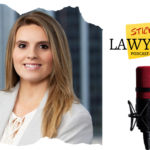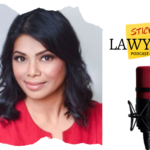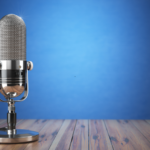Blogs & Social Media
How We Started Our Podcast
By Jonathan Spencer | 09.06.2023
John Reed [00:00:00] Hey everyone. John Reed here. I've been wanting to do a blog post for some time about podcasts—why a lawyer or a law firm might consider podcasting; how to start it. And then it dawned on me. Why not use the story of Rain's podcast, Sticky Lawyers, as a lesson, as context for that. So, I am usually the one sitting in the host chair, but we're turning the tables. Allow me to introduce my colleague, the inimitable, Jon Spencer.
Jonathan Spencer [00:00:28] Thank you, John.
John Reed [00:00:29] This is where you talk, because you’re going to be the interviewer, Jon. Jon is an uber-talented legal marketer who has also become a valuable go-to for all things “tech” at Rain, including overseeing production for Sticky Lawyers.
And Jon, if I haven’t said it lately or enough, you do such a great job with the podcast, and you’re just an integral part of Rain. So, I want to go on record with that.
Jonathan Spencer [00:00:51] Thank you, John. I appreciate that.
John Reed [00:00:53] So again, Jon will be the interviewer today, and I’ll be the interviewee. And so, Jon, this is when you welcome me to the show, and we engage in witty guest and host banter.
Jonathan Spencer [00:01:04] Oh, what shoes to fill.
John Reed [00:01:08] You’ll be great.
Jonathan Spencer [00:01:09] Thank you, John. I guess we’ll start from the beginning. Why did Rain decide to start a podcast?
John Reed [00:01:15] You know, kind of a couple different reasons. The smug reason is everybody else was doing it. But that’s not just to be a go-along, tag-along.
I think we needed to figure out how to do it. And we have kind of a philosophy here that we try to practice on ourselves first before we take a service to a client. And we couldn’t disregard the value of podcasting as a marketing tool. And so, we thought, “Hey, let’s jump in. Let’s give this a shot.”
And, and I, you know, it kind of surprises people. This comes up every once in a while. People say, “Well, how is it getting you business? You’re doing it to promote Rain, right? You’re doing it as a business development tool.” And I’d say not primarily, maybe not even secondarily. It’s a way to promote the Rain brand.
I think the tenor of the podcast is consistent with Rain, and so I think that it certainly has helped there, and we’ve had some people comment on it. We’ve had some newer clients and even, you know, some prospective clients say they found us because of—in part because of the podcast. But I would say it’s turned into more of a fun side hustle that just happens to be under the Rain umbrella.
Oh, God, I can’t believe I used that. Anyway,
Jonathan Spencer [00:02:35] Well, I’ve thoroughly enjoyed it. It’s been a wonderful opportunity to dip my feet into podcasting, and it’s fantastic. The topics are great, the attorneys that we speak with are very interesting, and you’re an amazing host.
John Reed [00:02:53] Oh, well, aren’t we just throwing compliments around here today? So, well, thank you. Yeah. Yeah. It didn’t start that way, but we can talk about that.
Jonathan Spencer [00:03:02] Well, yeah. So, let’s talk about the initial steps of hosting and running a podcast.
John Reed [00:03:09] Yeah, I am proud, if that’s the right word, of how deliberate we were in the beginning. We didn’t just jump right in and make a whole lot of mistakes.
We made mistakes, but I think we were pretty calculating upfront. So, the first thing I did is, what’s this going to take? Where does the podcast itself live? You got to host it someplace. Is that going to be on our website? Is it going to be on another platform? We didn’t want to hide it.
We wanted as many people to hear it as possible. So that’s syndication. Is it going out to Apple and Google or now YouTube, Spotify, and other places? And what’s the most efficient and effective means to do that? Gave a lot of thought to the investment, and not just the investment of money, but time and energy.
So that came down to are we going to do this from the ground up as a do-it-yourself DIY thing? Or are we going to hire it done someplace else? And we went and visited some different studios and, but also did lots of online research to determine what it was going to be. And I think probably most importantly, is we didn’t do this in a vacuum.
We looked at what else was out there in terms of legal marketing, podcasts, and what was our hook going to be. And actually, I think Sticky Lawyers, that phrase has been around for a while in my head, and the podcast was built around that as opposed to, let’s do a podcast and let’s find a name for it.
So, it was always going to be something about what makes you stand out and be sticky as a lawyer. Hence the name. But what exactly the gist was going to be, that actually changed a little bit here and there.
Jonathan Spencer [00:04:57] When did you start thinking about doing this and doing the investigating?
John Reed [00:05:02] Pre-COVID. By about a year, I think. So maybe, probably 2019 because we’d actually done a number of shows before the plague. And then we, then we had to figure out, you know, how to shift if we couldn’t get into the studio. But yeah, spent a lot of time thinking, thinking about that and we probably prepared to prepare a long time.
Maybe longer than we should but it was a big undertaking.
Jonathan Spencer [00:05:27] And this was your first foray into podcasting? Or had you tried this before?
John Reed [00:05:32] I’d been a guest on a couple. And so that helped a lot because both of those podcasts, the hosts and the engineers behind those podcasts were, I think, very good in telling me as a guest what to expect.
And how to prep. And I think we’ve, I hope you’ll agree, we tried to mirror that with our guests, too.
Jonathan Spencer [00:05:57] So, looking back at the beginning of Sticky Lawyers, how did you prepare to roll out this podcast? What were the steps that you took to get this podcast up and running?
John Reed [00:06:09] Yeah, I would say I was probably naive about what was required, and I overthought it. What do I mean by that? I made a decision early on that I wanted to be in a studio, having somebody else invest in the equipment, providing the space, doing the sound attenuation, all that stuff. And so, we looked around our area for people that were in the business, and we landed at a studio. I didn’t think the service was that great, but there weren’t that many games in town.
But I will say this, of the various studios that we visited, all of them had us on our initial visit, get into the studio and run demos, put the headphones on, get in front of the microphone, listen to yourself. And I can tell you I’m the last person that wanted to hear me speak.
Jonathan Spencer [00:07:03] I was going to ask, what was that like to hear yourself the first time?
John Reed [00:07:05] Oh, God, it was just so awful. It was nails on a chalkboard. Worse. But you have to get used to it. I had incredible stage fright. You know, how do, what am I supposed to say? I’ve never spoken before. What am I supposed to say? You know, those types of things. And you get used to it.
We also decided on a format. I think the interview format was always something we had in mind. And we practiced and one of the places where, the places where we recorded the first few times—the practice sessions, at least—the owner there said, “It’s gonna take you about 10 episodes or 10 sessions to get comfortable, to get your feet wet and have a good feeling.” And I think he was spot on. I think that was a great prediction.
Jonathan Spencer [00:07:53] And after those 10 episodes, how much did Sticky Lawyers the podcast evolve or change from those initial episodes?
John Reed [00:08:03] Yeah, I’d say we had a couple false starts.
The first iteration was, me talking to guests, not the current lineup of guests. These were pretty accomplished. We had identified some pretty accomplished legal marketers, in-house legal marketers, talking with them about effective legal marketing, you know, solid business development practices, and they were great.
I was boring. And I just didn’t see how we were any different than a lot of other podcasts out there. And I think I saw the runway was going to be really short. I just, I saw we were going to be repeating topics, and not being creative. And so, I put the brakes on that. And then for a very, very short time, maybe a minute and a half, it was me kind of just talking philosophizing, which, you know, as I say that I’m fairly certain we’ve destroyed those because I don’t want those ever surfacing ever again.
Jonathan Spencer [00:09:09] Is it the John Reed lecture series?
John Reed [00:09:11] Oh, God, it was just awful. It was just awful. I could’ve read the phone book and been more interesting.
Yeah. So, and then, you know, I think, and it’s all accident. I can’t say it’s any great. You know, epiphany or anything. But it was like, wait a second. We’re overthinking this. We’re trying too hard. What are we really trying to do? And we went back to the term sticky lawyers. Why are we talking about lawyers?
Why don’t we talk to lawyers? And we decided on a very, I guess, strict criteria. We wanted guests who were standout lawyers as practitioners, but who also have something else in their lives, in their personal lives, their professional lives, and their background, whatever, that make them memorable, that make them stand out.
And, better yet, if those two things feed into each other, then we’ve got a real winner. And we’ve stuck with that. And if I can digress for a moment, people often come to us and say, “Hey, I know somebody for your show.” And they may be great people, but not necessarily standout lawyers.
Or they may be standout lawyers, but that’s all they are. That sounds kind of harsh and, but I think we’ve stuck to our guns and because of that, I think we’ve got something special. I hope you would agree.
Jonathan Spencer [00:10:38] Oh, totally agree. And you know, when you have incredibly interesting guests, that takes the burden off of you to be the incredibly interesting host to keep people engaged and tuning into the podcast.
John Reed [00:10:54] It does. It does. And you know it’s funny, you mentioned that because you and I have had this conversation. Even though we’re rigid in our criteria for guests, we’ve kind of taken the walls down on other things. Right? For a while, you know, somebody once told me your average workout or your average commute are less than a half an hour.
So, if that’s the audience you want, give them something they can consume or digest as a podcast within that time. And early on, we tried to stay within that, and then it kind of crept up to 30, 35. And now it’s like, you know what, if there’s a guest and they’re rolling and they’ve got great things to say, we’ll go.
We’ll just, we’ll keep it going. And I, it’s funny, we call our listeners sticklers, right? Sticky Lawyer listeners. And we want to deliver a good product. But at the end of the day, it’s kind of, for me, it’s a little selfish, you know? So, if I’m having fun with the guests and I’m learning something, I’m just going to assume that those who choose to tune in are having that same experience too.
Jonathan Spencer [00:12:00] Well, if I could be your guinea pig listener while the recording sessions are going on, I get absolutely enthralled and caught up in the podcast and the time absolutely flies by. If it’s a great guest, then you don’t have to worry about that time restraint.
John Reed [00:12:17] Well, I, you know, if I may for a second, you asked about how things have changed.
Jonathan Spencer [00:12:21] Yeah.
John Reed [00:12:21] And at the outset, I was adamant that we go to a studio, you know. Take advantage of their professional setup. And we’ve had the great fortune of late to work with somebody who showed us the light. And for not a lot of investment, far less than what we’re spending on commercial space.
We’ve gone home, we’ve taken the, we’ve taken the show on the road as it were. And we use a platform, it’s called SquadCast, and we record audio. But we, as you know, Jon, we get to see video, we get to see each other and the guest. And one thing I learned when I prepare for an episode, I’ve got things written out, I’ve got questions written out, and I thought it would be disrespectful to the guest if I wasn’t making eye contact, if I was looking at my iPad or a piece of paper or something like that.
And we’ve moved to SquadCast, and again, totally changed my opinion. I may not be looking at the guest all the time, and I was fearful that I wouldn’t have that natural conversation, and it would seem somehow rude. Number one, I don’t think it’s been an issue at all. But the real joy is watching you while I’m having a conversation.
Jonathan Spencer [00:13:32] My reactions.
John Reed [00:13:33] Yeah. It’s like an extra audience, right? You know, and I think the guests enjoy it, too. You know, it’s more of a group conversation than just one-on-one.
Jonathan Spencer [00:13:43] I’ll make sure to keep myself on mute. Look, we’re talking about formats. Shifting gears slightly, have you considered advertising or how did you decide on the lead ins and outs, and how did that change over the episodes?
John Reed [00:14:01] Yeah. You know, hey, confession time, I was very influenced by Malcolm Gladwell’s podcast. His gift for storytelling, his intros, his monologues sometimes are just very captivating and so early episodes of Sticky Lawyers had me trying to approximate that.
And while I enjoyed it you know, hey, we’re a marketing firm. We learned from feedback. We adjust what, you know, when the market tells us to. And our audience said, would you get to the guest already? So, I’ve tried to shorten the intro a little bit. Music was never not an option. We were always going to have music.
If you’ve been a loyal stickler, Sticky Lawyers listener, you’ll know we recently changed over. We got a little hipper with our music. Not that it wasn’t hip before, but it’s hipper now. And so, you know, the intro and the outro is purposefully shorter now to get people into the conversation, to get listeners into the conversation.
And look when the conversation’s over, not a lot of people are gonna hang out at the end. Right. You know, so we do ask for subscribers and reviews and those things at the end. Maybe we should put it at the front, I don’t know how I feel about that yet, but it’s all subject to change. But your big question though was, was ads.
Again, if you go back and listen to some of the earlier episodes, we interrupted. And I use that word purposefully. We took a break to run a Rain BDM ad talking about some service that we did, and again, in a kind of a Malcolm Gladwell way, you know, in a story around our service. And again, the, you know, feedback that we’ve gotten from the audience is like, just let me hear the whole thing, you know?
Don’t interrupt it. And I haven’t found a, I haven’t determined if or how we can reintroduce ads back in. And I think, you know what, most people are getting this through our newsletters. They’re getting it through some sort of Rain communication. So, it’s like, don’t insult the audience.
They know who we are. They know what we do. They can find us. So, I’m less worried about that. But I think that ultimately the goal was differentiation. And I think we’ve achieved that. It, not just that we’re different from every else. I think we offer something of substance.
Jonathan Spencer [00:16:24] Moving back to the most important part of the podcast, the guest. How do you identify the topics to cover, the guests to reach out to and invite, and what’s the process?
John Reed [00:16:38] Yeah, and we, boy, we’ve been honing that, haven’t we? I think Sticky Lawyers is a little bit different, so I’ll speak to that first and then I’ll generalize it.
We’ve talked about the criteria for guests but how do you find the guest who’s an expert on exploration law or music law or international human rights, or whatever it may be. And it kind of starts from two different angles. Alternatively, the first is, do we run across somebody who’s interesting in the news and bingo, that’s somebody we want to talk to?
Or do we start from, hey, what’s a novel area of anything, the law or otherwise? And is there a lawyer who does that? And we don’t stop there. Then you’ve got to go find the person or the people, candidates for guests and see if they’ve got that extra element. And that’s just so fun, you know? Yeah. It’s the investigation. It’s the sleuthing around to see if somebody exists.
And we’ve backed away from topics because we just haven’t found a lawyer that really fits the bill. But to generalize that, I’d say, I think it’s incredibly important for anybody. But let’s talk about law firms for a second, for any lawyer or law firm considering a podcast to say, okay, what are you trying to get across here?
If it’s your subject matter expertise, then what’s the right format? Is it an interview? Is it you talking, but in shorter sound bites? You know, how are you getting your thought leadership across? And I don’t think you should do it in a vacuum. I think you should, you know, look, for those of us who went to law school, the beginning of every casebook. You’re not just reading random cases, you’re reading cases grouped by a subject.
And so, I think if you are an expert in real property or constitutional law or litigation or estate planning or whatever, I think it’d be helpful to kind of map out, I don’t know, a season a series just like you would a table of contents. What do you want to cover? And then for each of those subtopics, what’s the best way to deliver that information?
Through stories, through guests, you know, whatever the format may be. So that’s kind of the framework in general. But then, you know, the Sticky Lawyer-specific, our process, the procedural aspect of the podcast, obviously everything starts with the guests. We do guest outreach and we’re very respectful about that.
We make it very clear it’s not a sales call. We’re not selling anything. Sticking to the standard, probably the thing that’s become absolutely critical is the discovery call. Agreed. We invite people to talk with us. We invite them on to come on SquadCast, our recording platform, not to record, but just so they’re comfortable with it.
We give them directions on basically treating it as a guest—excuse me—a dress rehearsal. So, you know, please have the headphones and the microphone set up that you’re going to have. And that way, you know, for the one time out of 10 when it doesn’t work out, we have a means to try to address it. The recording— probably the hardest thing about the discovery call is having too much fun and saving something for the recording.
Yeah. You know, we find out just enough so that we can go from an exploratory conversation in the discovery call to something a little more structured in the recording.
Jonathan Spencer [00:20:12] But you’ve also, you’ve also found in these discovery calls that your original impression of what you wanted to talk to the guest about shifts or may shift, or you may find out some new aspect of their lives that’s just as exciting and interesting that we didn’t know about before.
John Reed [00:20:28] Isn’t it funny that we call it the discovery call? Yeah. When that happens, as often as that does. Yeah. We, I, for the sake of our guests, I will not name names.
But there have been a few times where we got on a call and had an assumption, and you’ll know what happens when you assume anything, but we’ve got on the call, and we’ve made an assumption. And the assumption was disproved or tweaked, but then simply by chatting a little bit longer, we find something out.
And it still fits our definition for sticky lawyers. And yeah, it makes for a great podcast when we ultimately record. So, yeah, don’t ever misjudge the value of having that pre-recording discovery call with a guest.
Jonathan Spencer [00:21:15] And for aspiring podcasters, how has your or our technology changed? I know we originally started the podcast in a studio and have since moved remotely. How do you recommend setting up podcasts and taking care of the technological aspects?
John Reed [00:21:33] Yeah, and that, and again, this is where I really, overthought things up front. I thought I’m going to have to, you know, put foam pads on the wall, or you hear the stories about podcasters that sit in a closet in their homes, you know, with blankets over their heads. I was like, I’m not having that. Again, we’ve had the good fortune of engaging with a consultant as we engage with our clients. We engaged a consultant to help us figure things out.
And I had a USB microphone I purchased before. And I fell for all the marketing—looks great, and I was told “back my car over it,” quote unquote. There are options out there for good recording. I think you do some investigation. Anybody who’s interested, I’m happy to share names directly. I don’t want to do it here, in terms of brand names. But suffice it to say, it’s probably easier than one might think to have a good quality setup. And I think the other thing, again, going down the technical road here, we’ve mentioned SquadCast. We’re not getting any kickbacks. We get no financial consideration for mentioning their name.
It’s just what we use now. But we discovered another tool called Descript which is unbelievable in terms of allowing us to edit the podcast by simply moving words around on the screen, which I still can’t fathom that.
Jonathan Spencer [00:23:01] Witchcraft.
John Reed [00:23:02] Yeah, it is that, it is, it is truly that. We use something called BuzzSprout to host our podcasts.
And we could have a website through BuzzSprout, but we’ve chosen to use another service called PodPage to have the Sticky Lawyers website. So, we’ve made some kind of well thought out key, you know, investments, subscriptions, whatever you want to call it, to have all that we need to in a pretty cost effective way. Record, produce, edit, distribute and get the word out, you know, as far as we can with the podcast
Jonathan Spencer [00:23:50] And the flexibility that this offers for both us and the guests to be able to do this remotely on our timeframe, our schedule, not have to worry about scheduling physical time in studios has been phenomenal.
John Reed [00:24:03] Well, I think you just said it. I mean, we, in the end right before we decided to go home, we had a great studio setup, great sound engineer, great location. It was very disciplined. We knew if we’ve got this recording time, I had to get my act together and get my prep done before going there.
We knew we had to be efficient with our recording time because we were going to be kicked out by the next recording session. But that wasn’t amenable to guests that were in different time zones or couldn’t have that flexibility. So, I think you said it, I mean, it’s kind of self-evident that when you can take your show on the road, go home. And, you know, I’ve recorded from my home office but I could easily pack up this microphone and a computer and headphones and go somewhere else and do it and sound just as good and have that much control. So, you know, don’t overthink the setup and don’t overthink the cost. And it’s probably easier than one might think.
Jonathan Spencer [00:25:12] So we covered the recording. And we covered a bit about the post-production. The final step is getting it out there and getting the word out about the podcast and driving the audience. Advice or tips of how we do it or others should try?
John Reed [00:25:29] Yeah. You know, whatever platform you use to host, definitely make sure it handles the syndication for you. I can’t imagine you would do it otherwise.
I don’t know how to get a podcast out specifically to Spotify or Apple or Google without going to an omnibus, you know, one-stop shopping type of platform. So I think the choices there are good in terms of what we do to get it out there. We put up a blog post every time we release an episode that’s on our Rain BDM website.
It automatically goes up on StickyLawyers.com. We send out a newsletter to our followers saying the next episode is now available. We put it out on social. And it is not a determining factor for having a guest, but we let it be known to our guests that we’d love for them to promote the episode to their followers on their social accounts.
And again, we don’t have any demands. We don’t have any requirements. But you know, I look at it this way. Why wouldn’t you? Right. We’re going to put you in the, I promise every guest, we’re going to put you in the best light possible. So, treat this as a marketing tool for yourself. I mean, and they’re all lawyers that, and they’re trying to get more business, so have at it.
Jonathan Spencer [00:26:52] That’s right. So, I guess wrapping up the conversation for those out there who are aspiring attorneys, law firms that would like to start a podcast, what would be your key takeaways for building a successful program?
John Reed [00:27:10] Yeah, and it’s funny, we’re ending with this because it’s really the starting point, right?
Who’s your audience? If your audience is you, okay. I mean, no, and I don’t need be glib about that, but I think we’ve listened to a lot of podcasts where, unlike myself, there are people that really like to hear themselves talk. And if that’s why you want to do it, great, fantastic. But just know if your audience are in-house counsel, are you speaking that language? If your audience are laypeople, business owners, or individuals, depending on what your area of law is, make sure you are presenting your thoughts, your knowledge, your expertise in a way that resonates with them directly or through guests or through conversations.
What do you want them to learn? If, is it a how to? Is it, you know, current events and insights? The format is going to help you to teach them. But I think you have to also ask, what do you want them to do with what they learn? So, if you want this to be a hard charging, lead-generating marketing channel, which again is perfectly fine, if that’s what you want it to be, then you have to consider what your calls to actions, calls to action, call—what you want them to do. And what you’re offering them is an incentive to do that very thing.
You know, I haven’t, I don’t know that I’ve come across a law firm podcast yet that’s accepted outside advertising. But are you going to take time in your podcast to step away from an interview or step away from, you know, the bulk or the, just the thrust of the episode to promote your firm? That’s a choice you have to make, too. Well, I think you’ve also got to, if I may, just think. I think you’ve also got to ask, is a podcast just a shiny new object or is it an effective marketing tool for what you’re trying to accomplish?
I know one of the reasons we, I don’t want to say promote, but we’ll happily discuss an audio or video podcast with a law firm client is it gives that perspective client an opportunity to hear you and see you. And depending on what their legal need might be, the emotional hurdle of reaching out to an attorney to discuss whatever it is that’s facing them. When you can have that handshake, have that first introduction via a podcast video or podcast audio recording, that may be the thing that makes them more comfortable with you and gets them over the hurdle.
Jonathan Spencer [00:29:59] Gives them an opportunity to experience what it’s like to work with you.
John Reed [00:30:03] Right on, man. Well said.
Jonathan Spencer [00:30:05] There you go. In terms of law firm podcasts, do you see more quick hitter podcasts that are almost a client alert type of format of, “Hey, change in the law. This is what’s going on. Reach out to us to discuss,” or do you see longer form interview-style about trends or is it a mix of both?
John Reed [00:30:31] It’s definitely a mix and it’s definitely a strategic decision. And I don’t know that it has to be one or the other. And let me explain what I’m thinking there. Again, if your audience consists of people that could benefit from those quick hit alerts, that need that update, and you can quickly get it to them so when the update needs to go out, the update needs to go out, that’s great. If a longer form dissection analysis of an issue requires it, whether it’s an interview or a longer format, then you do that as well.
And I think you can mix and match. We see law firms do that with emails, newsletters, sure, alerts. And I think you can approximate that with a podcast as well. I also think, have fun with whatever your format is.
If you’re a business law firm, you could go the Sticky Lawyers route and not talk about business law and not talk about yourself as a lawyer or your firm. Instead, get some great clients and have them come on and talk about their businesses and how they started and how they’re succeeding. And if they happen to give you a tip of the hat or a nod because of your excellent legal counsel throughout the course. It’s kind of implied, you know, that they would be on your podcast because they’re your clients and they trust what you do. Or maybe it’s like Sticky Lawyers and they’re not clients. Just, you know, I guess that’s a disclaimer we should make, and that is none of the guests we have on Sticky Lawyers are Rain clients.
And so, you can do it either way. So, I’d say there’s a lot of leeway into how you can format your podcast.
Jonathan Spencer [00:32:27] Any other key takeaways for the audience?
John Reed [00:32:31] Practice it. It would be rare that you feel comfortable your first time out, if you’re going to be a host or a producer for that matter.
So, practice. Find a safe harbor, great client you know, colleague down the hall somebody else, and just practice and let them know this could very well be the first pancake and it gets thrown out. But I think you have to get your sea legs and you have to understand it. The other thing too is you’ve got to commit.
I don’t know how many times I’ve seen on Spotify or Apple Podcasts or wherever the three or four or five or eight-episode podcast and then there’s nothing. And it wasn’t like it was meant to be a contained one time series, it just died. And I think that’s probably more harmful than not starting one at all.
And I’d say have fun. Because if you’re not having fun with it, you’re not going to sustain it. You could have a whole long list of topics and guests, but if it’s drudgery for you, it’s going to be really hard and it’s going to come across that way. So have fun with it.
So, Jon, this is the part where you thank me for being a guest and offer some catchy pithy sign off.
Jonathan Spencer [00:33:42] Well, thank you very much for being a guest today, John. And I can’t wait to get back on the other side of the microphone, so I can go back to being muted backstage.
John Reed [00:33:54] Right? Consider yourself muted. So wonderful. Hey, I guess in keeping with the fact that we are Rain and we are a law firm marketing and business development firm, if you’ve got questions about podcasting or any other aspect about your firm’s marketing and business development practices, get in touch with us.
We’d be happy to chat.






